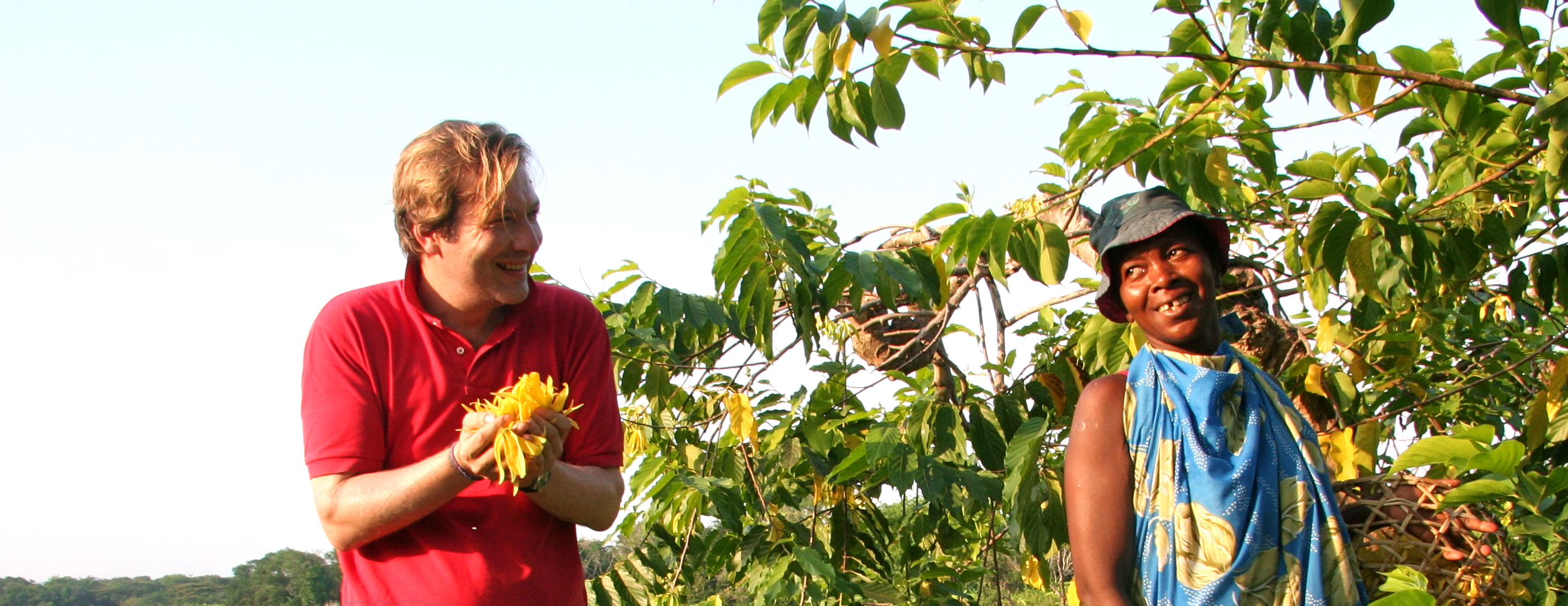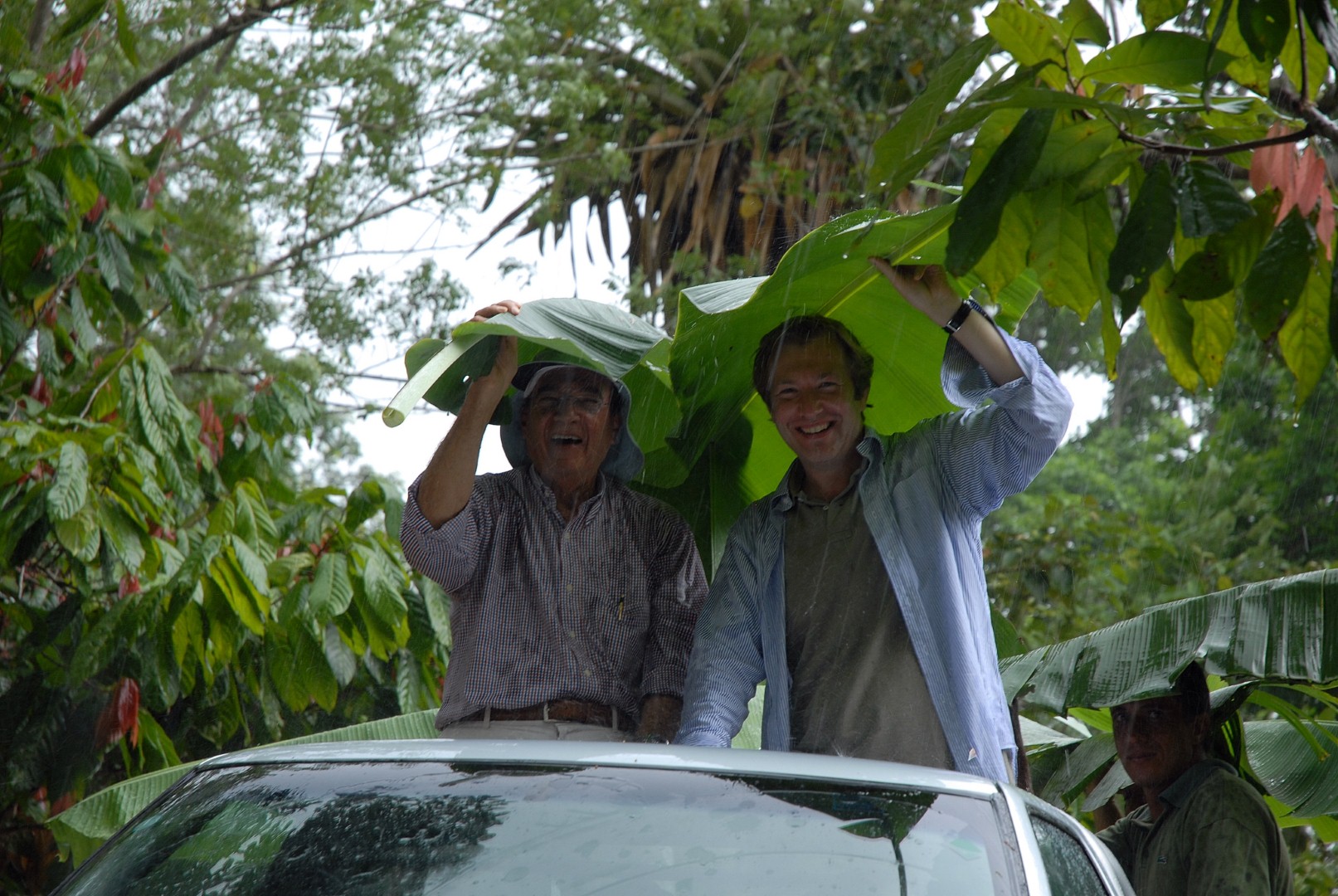The cacao plant was first given its botanical name by Swedish natural scientist Carl von Linné (*1707-†1778), who called it “Theobroma cacao” (“cocoa, food of the gods”). This was the first contribution of Sweden to the world of chocolate.
Just like pepper or coffee, this beautiful name, cocoa, is associated for many people with exotic adventures in remote countries. As a child, traveling the world was irresistibly attracting me and this is indeed how these wonderful products first got my attention. My chance was given to me by my father, through whom I discovered early the world of plantations in Africa.
As a Swedish diplomat, my father first worked for the Embassy in Paris in 1945. Years later his journey took him further south to Cameroon, where he ran a trading company, until, eventually, he settled in Madagascar in the 1970’s after he had taken over mining companies and sisal plantations.
So it is in Madagascar, at our family estates, that my journey through the fascinating world of cocoa, spices and other delicious natural wonders really started. There I have learned over the years the secrets and subtleties of managing and developing plantations. Ultimately, I focused on and specialized in fine cocoa and spices, whilst my consistent aim was to achieve the highest quality in a sustainable way.
Today, my plantations in Madagascar, in Brazil and Indonesia supply world famous chocolatiers and chefs. In close collaboration with these passionate artists, I experienced the fascinating artwork to conjure cocoa into chocolate or how pepper enhances recipes and, ultimately, I launched a small and exclusive line of chocolate and fine exotic foods.
The creation of ÅKESSON´S could not have taken place without the close collaboration and support of my family and friends. I am eternally grateful to all these people and especially to the growers and the team with whom I work every day.
Together, we now invite you to a journey of discoveries through the world of our tropical foods…
Thank you for sharing our love for ultimate quality,
Bertil Åkesson
We aim at offering to our clients our passion for tropical foods and the highest possible quality achieved in a sustainable way. We want people to purchase our cocoa and other fine exotic foods because of their superior quality, not because of how we grow it.
However, our values are important and besides our action on the field, we chose to dedicate in this web-site a section about it to contribute in bringing a new awareness about today’s greatest challenges in our society.
SUSTAINABLE PEOPLE

- In MADAGASCAR, we are certified “Fair for Life” by IMO. The plantation is a single living organism where we try to provide a secure working and social habitat. Food, shelter, health, security, liberty and spiritual activity are what the farm offers.
For example, we converted all our estate to solar energy (GAÏA Alternative Energy) and redistribute half of the electricity to the village nearby where our employees live and supply portable solar panels to the most remote places. We provide land to our employees so they can be self sufficient and grow their own rice for their family. We contribute in building schools and finally, in a country where medical goods are not easily available and where employees easily spend up to half their revenues in medicines, we have organized to collect them in Europe and redistribute them on the plantation. All this is to be added to the best possible retribution and the integration of the whole families to our community.
- In BRAZIL we are certified by UTZ the largest program in the world for socially and environmentally responsible cocoa production. We purchased our plantation in May 2009 and our first move was to rebuild a decent housing for our employees, with water access, fully equipped kitchen and bath rooms and septic tanks. To many of you who read this article, things like this sound normal. Unfortunately, they are not and what is usually described as “Fair Trade” redistribution of wealth still does not pay for these “luxuries”.
We also have our own school for children under 7 years old and we renewed the 4 km road so that the local bus can come every morning to pick up the older kids living to the nearest city.
All our employees are officially declared and the extra amount that we pay to the State is redistributed. This sounds obvious in Europe or in America but it is still very rare in Brazil where traditionally people receive part of the production as a salary, which is not sustainable in a sense that is does not guaranties any income for retirement or social security, although the system works in a country like Brazil.
- In BALI, with direct support from USAID and AMARTA, we source from the first fully integrated fermented cacao value chain in Indonesia operating a Central Processing Unit (CPU) for the efficient fermentation, drying, warehousing and sale of Bali cacao. The CPU is a necessary step in the development of long term sustainable supply.
Cacao farmers provide wet beans to the CPU, which manages the processing through fermentation, drying and sorting. Then we purchase the finished cacao and a small transparent toll is imposed for processing services rendered.
The central processing unit aims to both ensure consistent high quality product and serve as a processing training center to regional farmers/farmer groups/cooperatives In Indonesia, the NGO “SwissContact” provides the sustainable support to collect our organic cashew nut from the Island of Flores.
- In FRANCE, we are supporting the action of the Jewish association “Oeuvre de Secours aux Enfants”, in Paris, created in 1912 by Jewish doctors in St Petersburg. All our fine exotic foods are packaged there and 30 euro cents are given to the workers for every item packed (jars or pouches, and even 70 euros cents for the tins). The association hosts 65 adults with disabilities, primarily mental and motor, and offers them a job with appropriate management, thus providing them with financial and social independence. Workers can complete internships or work a few days a week or just occasionally.
SUSTAINABLE PLANET
PLANTATION MANAGEMENT:
- In MADAGASCAR, all our products – cocoa, peppercorns, coffee, essential oils – are certified organic by “Ecocert” for Europe & NOP for the USA. While world leaders call for action at climate talks, we converted all our estate to solar energy (GAÏA Alternative Energy)
- In BRAZIL, “Fazenda Sempre Firme”, the plantation we bought in May 2009 has a commitment to the maintenance and preservation of the Atlantic Forest (Mata Atlantica). 10 % of our land has a forest area. We re-plant species such as Mogno, Eka and native varieties as Pau-Brasil, Peroba, etc. Besides we are also helping neighboring communities to protect the environment, avoiding hunting of animals, extraction of trees from reservations, protection of the river heads and rivers, selection and adequate destination of garbage. Our commit;went is certified by UTZ.
- In BALI, cocoa and coconut blossom sugar production units are certified organic by “Control Union Certifications”.
PRODUCTION of CHOCOLATE & FINE EXOTIC FOODS:
- Åkesson’s Organic, Ltd, is a company registered in the United Kingdom and as such has all its organic products certified by “Soil Association”
- Our chocolate production is in FRANCE and certified organic by “Qualité France”.
- We use certified organic cane sugar from BRAZIL or certified organic coconut blossom sugar from BALI.
- We use exclusively non-genetically-modified soja lecithin. At this point we would like to make it clear that there is nothing wrong about using soja lecithin; the real issue is that 80% of the world production is genetically modified, which is why some people radically choose to avoid this ingredient.
PACKAGING:
- The ink we use to print our chocolate packaging or our stickers is natural and organic – no chemicals are used.
- As far as possible, we use the minimum quantity of paper and packaging material. We do not print brochures (experience shows it ends up in the bin anyway), all necessary information is available on the internet.
- Our Pepper glasses are sourced from the only company in Europe manufacturing 100% ecologically recycled glass. Why?
1/ Recycled glass is melted at a lower temperature and therefore uses less energy (the saved energy on recycling one single bottle is enough to maintain a 100W light bulb for 4 hours). The air contamination is reduced by 20% because less energy is needed compared to other kinds of glass.
2/ It reduces sand and raw material extraction and avoids the destruction of natural resources.
3/ The volume of waste going to landfill is dramatically reduced as well as that which is involved in the illegal and uncontrolled tipping of waste (On average 1000 recycled bottles corresponds to 1 ton less of waste going to landfill). So by recycling 1 kg of used glass we save 6 litres of water + 1.2 kg of natural resources + 20% on energy. Buying recycled glass products is part of an overall waste reduction strategy. Until materials are made into new recycled content product they are not really recycled. Only when you buy recycled glass you “close the loop “to complete the recycling process and then really demonstrate commitment to environmental issues… and glass can be recycled repeatedly without any reduction in quality.




